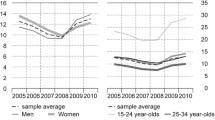Abstract.
In this paper we present a simple model of labour supply that is cast within the framework of an extended family. The model emphasizes a Ricardian division of labour whereby the specialization is solely driven by marginal productivity and value of time differentials. The empirical implications of the model are derived and tested using data that was collected in France to study the extent of trade within the family network. We find evidence that the extent of specialization is sensitive to the value of time differentials.
Similar content being viewed by others
Author information
Authors and Affiliations
Additional information
Received: 17 May 1995 / Accepted: 20 February 1997
Rights and permissions
About this article
Cite this article
Lacroix, G., Picot, M. & Sofer, C. The extent of labour specialization in the extended family: A theoretical and empirical analysis. J Popul Econ 11, 223–237 (1998). https://doi.org/10.1007/s001480050066
Issue Date:
DOI: https://doi.org/10.1007/s001480050066




